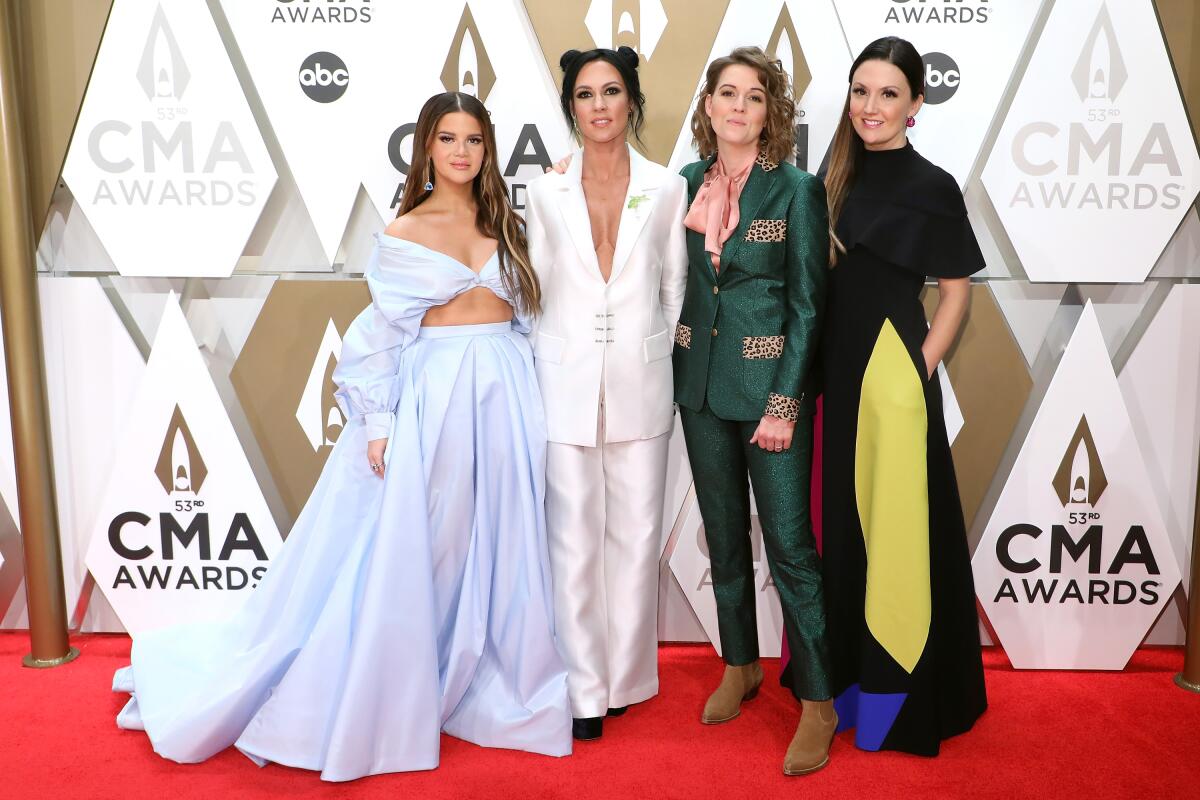Maren Morris is getting the hell out of country music: ‘I’ve said everything I can say’

- Share via
Maren Morris calls her new two-track EP “The Bridge,” which is just one of several metaphors she deploys in imagining a path out of the world of country music in which she became a star.
On “The Tree,” the Grammy-winning singer-songwriter says she’s “done filling a cup with a hole in the bottom”; “Get the Hell Out of Here” opens with the admission that she “watered the garden but forgot to fill the well.”
It’s not that Morris, 33, has tired of twanging guitars or neatly cornered rhymes, both of which define the tunes that came out Friday, a decade after she moved to Nashville from her native Texas, first to write songs for established country acts such as Tim McGraw and later to sign a major-label record deal of her own. Rather, she says she’s leaving because of what she views as the country music industry’s unwillingness to honestly reckon with its history of racism and misogyny and to open its gates to more women and queer people and people of color.
Thus the rootsy yet polished “The Bridge,” which Morris — a six-time winner at the Country Music Assn. Awards with four No. 1 hits on Billboard’s Country Airplay chart — describes as a deliberate transition between her Nashville success and whatever comes next.
“I thought I’d like to burn it to the ground and start over,” she says of country music. “But it’s burning itself down without my help.”

The singer acknowledges that, as a white woman, she’s benefited from the system as it is. Yet Morris, who says, “Allyship begins with waking up from something really comfortable,” has been vocal in her criticisms onstage and on social media, where she tangled last year with country star Jason Aldean and his wife over young people seeking gender-affirming healthcare. The spat even made it to Tucker Carlson’s Fox News show, where the right-wing host described Morris as a “lunatic.”
“The Bridge,” which marks Morris’ move to Columbia Records from the label’s Nashville division, arrives accompanied by a music video for “The Tree” in which she strolls through an emptied-out small town as she hears “the sound of a new wind blowing.” A sign welcomes visitors to the place “from sunrise to sundown” — a reference, perhaps, to the threat of racist vigilantism many perceived in Aldean’s recent “Try That in a Small Town” video; other signs in front of boarded-up buildings read “GO WOKE GO BROKE” and “DON’T TREAD ON ME.”
An experienced collaborator known for her duets with Taylor Swift, One Direction’s Niall Horan and EDM star Zedd — not to mention her Highwomen supergroup with Brandi Carlile, Natalie Hemby and Amanda Shires — Morris is currently at work on her next LP with prolific pop producer Jack Antonoff, with whom she recorded “Get the Hell Out of Here.” (Greg Kurstin produced “The Tree.”) Morris, who lives in Nashville with her husband, singer-songwriter Ryan Hurd, and their 3-year-old son, spoke to The Times in a phone call from a tour stop in Calgary ahead of a gig Sunday as part of the Coastal Country Jam festival in Long Beach.

Four country songs have topped Billboard’s Hot 100 in 2023. But each has raised complicated questions about who’s welcome in Nashville — none more so than “Try That in a Small Town,” which drew widespread condemnation with a music video shot at the site of a lynching. Has this been a good year or a bad year for country music?
I’d say, sure, congratulations on crossing over onto the big all-genre chart. But the stories going on within country music right now, I’ve tried to avoid a lot of it at all costs. I feel very, very distanced from it.
Because you were seeking distance?
Yeah, I had to take a step back. The way I grew up was so wrapped in country music, and the way I write songs is very lyrically structured in the Nashville way of doing things. But I think I needed to purposely focus on just making good music and not so much on how we’ll market it. The last few records, that’s always been in the back of my mind: Will this work in the country music universe?
Obviously, being one of the few women that had any success on country radio, everything you do is looked at under a microscope. You’re scrutinized more than your male peers, even when you’re doing well. So I’ve had to clear all of that out of my head this year and just write songs. A lot of the drama within the community, I’ve chosen to step outside out of it.
Did that drama — your feud with the Aldeans, let’s say — push you in that direction? Or were you headed that way from the beginning?
I’ve always been an asker of questions and a status quo challenger just by being a woman. So it wasn’t really even a choice. I didn’t think of myself as a political artist. I just wrote songs about real life through a lens of deep respect for my country heroes. But the further you get into the country music business, that’s when you start to see the cracks. And once you see it, you can’t un-see it. So you start doing everything you can with the little power you have to make things better.
That doesn’t make you popular. But I don’t think that biting the hand that fed you is a real thing. It’s kind of a fallacy at this point, with all this fear-mongering about getting Dixie Chick-ed and whatnot. Country music is a business, but it gets sold, particularly to young writers and artists who come up within it, as almost a god. It kind of feels like indoctrination. If you truly love this type of music and you start to see problems arise, it needs to be criticized. Anything this popular should be scrutinized if we want to see progress.
But I’ve kind of said everything I can say. I always thought I’d have to do middle fingers in the air jumping out of an airplane, but I’m trying to mature here and realize I can just walk away from the parts of this that no longer make me happy.
What changed?
After the Trump years, people’s biases were on full display. It just revealed who people really were and that they were proud to be misogynistic and racist and homophobic and transphobic. All these things were being celebrated, and it was weirdly dovetailing with this hyper-masculine branch of country music. I call it butt rock.
“Try That in a Small Town” clearly resonated with many listeners.
But I think it’s a last bastion. People are streaming these songs out of spite. It’s not out of true joy or love of the music. It’s to own the libs. And that’s so not what music is intended for. Music is supposed to be the voice of the oppressed — the actual oppressed. And now it’s being used as this really toxic weapon in culture wars.
Morris, who sparred with Jason and Brittany Aldean over their transphobic social media posts, says that country music is fractured, and that’s not a bad thing.
Does your leaving country music mean the libs have been owned?
I’m sure some people may think that. And I would say, “Feel free. Go ahead.” I don’t want to have an adversarial relationship to country music. I still find myself weirdly wanting to protect it. But it’s not a family member. That’s the f—ed-up part, is that I’m talking about it as if it’s a person, but it’s not. So it’s a lot of deep deconstructing that I’m still unraveling.
These songs are obviously the result of that — the aftermath of walking away from something that was really important to you and the betrayal that you felt very righteously. But also knowing there’s a thread of hope as you get to the other side. I hope it comes across that way because I truly was in a space of hope when I wrote the two songs, even though “Get the Hell Out of Here” is really heavy. It’s about disarming that trauma and saying, “I can’t bail water out of this sinking ship anymore. It’s so futile. I choose happiness.”
In that song you say, “I fed all my good intentions while I starved myself.”
Something I’ve learned this year is that you don’t have to be perceived to exist. I’ve been reading a lot of bell hooks and literature about removing yourself from ego, and I’m finding joys that have nothing to do with music. I’ve been playing tennis a lot. I went to the U.S. Open and Wimbledon. Exploring my interests that don’t make me money has been really healthy for me.
And then making this record, working with Jack Antonoff, it’s like, let’s write something bats— insane today, and it might suck, but this is what I used to do when I moved to Nashville 10 years ago. The freedom to fail, you know? New collaborations have been helpful for me too in getting perspective on feeling like the hall monitor of country music. The people I’m working with now have no idea what’s going on or the names I’m talking about.

Is “Get the Hell Out of Here” indicative of the album’s sound?
A little bit. I’m still writing, so the record’s not done. But there’s a lot of things going on musically in it — quirky jam-band moments to, like, prog rock. It’s so fun, and I feel like my old self back in this space of writing songs I love with people I love.
Whose career path do you admire in terms of the ability to move from one style to another?
Certainly Taylor Swift. She’s been such a great friend over the years and has been really helpful in ways she probably doesn’t even realize in conversations I’ve had with her about everything you and I have been talking about.
On a more historic level, Linda Ronstadt. She’s weaved through so many different genres, and she just had one of those voices that can kind of fit anywhere because you believe her when she sings something.
You performed a song with Swift at an Eras tour stop in Chicago. What did you think of the show?
It was so inspiring. Performing for 3½ hours, three days in a row — no one can do that but her. And it’s such a supportive crowd: 90% women and 10% gays and dads. I’ve never felt so safe at a live show before. No one’s hammered or puking in the aisles or getting into a fight or anything. It’s just so joyful. And the way she makes that huge stadium setting feel intimate is astounding to me. In Chicago, I started running down the catwalk toward her after I came out of the hydraulic lift. She said, “Take your time,” and I was like, “OK, good, because this thing’s a mile long.”
- Share via
Watch L.A. Times Today at 7 p.m. on Spectrum News 1 on Channel 1 or live stream on the Spectrum News App. Palos Verdes Peninsula and Orange County viewers can watch on Cox Systems on channel 99.
More to Read
The biggest entertainment stories
Get our big stories about Hollywood, film, television, music, arts, culture and more right in your inbox as soon as they publish.
You may occasionally receive promotional content from the Los Angeles Times.













